

11. Differences between China and U.S. are unavoidable but they are not the primary component of the bilateral relationship
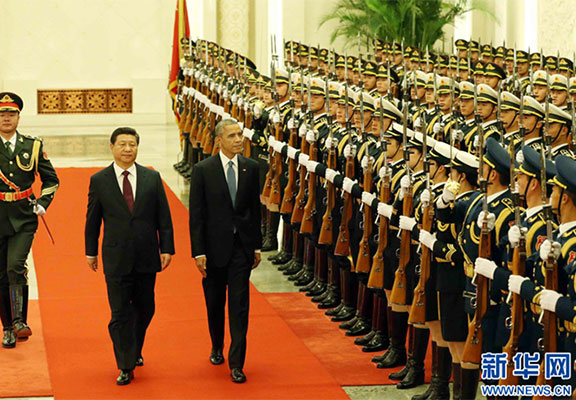
【Date】 November 2014
【Location】 Beijing
【Occasion】In talks with then-U.S. President Barack Obama in the Zhongnanhai compound
【Remarks】China and the U.S. have different national conditions, histories, cultures and paths of development. Thus, the two sides should understand and respect one another and live in harmony while maintaining their diversity. Differences are unavoidable but they are not the primary component of the bilateral relationship, and the two governments should properly handle their differences so as to maintain stable bilateral relations.
12. Cooperation between China and the U.S. will benefit both countries, whereas confrontation will hurt both
【Date】 July 2014
【Location]】Beijing
【Occasion]】The Sixth Round of China-U.S. Strategic and Economic Dialogue, the Fifth Round China-U.S. High-Level Consultation on Person-to-Person Exchange
[Remarks] Both history and reality have shown that cooperation between China and the U.S. benefits both nations, whereas confrontation hurts both. China and the U.S. can cooperate to succeed in undertakings that benefit both countries as well as the rest of the world. On the other hand, confrontation between China and the U.S. is bound to be disastrous for the world.
13. China-U.S. relations should not be led by problems
【Date】July 2014
【Location】Beijing
【Occasion】The Sixth Round of China-U.S. Strategic and Economic Dialogue, the Fifth Round of China-U.S. High-Level Consultation on Person-to-Person Exchange
【Remarks】The way China and the U.S. perceive each other’s strategic intentions will directly affect their respective policies as well as the development of bilateral relations. When faced with problems, the crucial thing is to work together to resolve them instead of letting the problems fester.
14. China and the U.S. should seek common ground while preserving or resolving differences
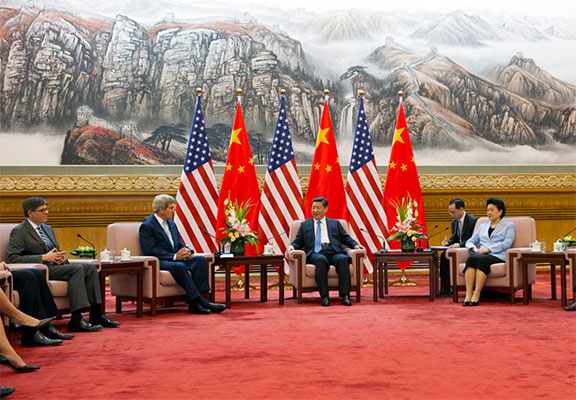
【Date】July 2014
【Location】Beijing
【Occasion】In talks with then-U.S. Secretary of State John Kerry and then-Secretary of the Treasury Jacob J. Lew at the Great Hall of the People
【Remarks】Both sides should seek common ground while preserving or resolving differences. Anything conducive to injecting positive energy into bilateral relations should be incorporated, while negative influences should be eliminated.
15. To plant more “flowers” and fewer “thorns” in the development of China-U.S. relations

【Date】July 2014
【Location】Beijing
【Occasion】In talks with former U.S. Secretary of the Treasury Henry Paulson at the Great Hall of the People
【Remarks】To develop China-U.S. relations, both sides should follow the major consensus that President Obama and I reached on building a new model of major-country relations between China and the U.S. We must always insist on enhancing and accumulating mutual trust, expanding mutual interests, strengthening cooperation, planting more flowers and fewer thorns, removing interferences and avoiding suspicion and confrontation.
16. Enhancing dialogue and cooperation is the only correct choice for China and the U.S.
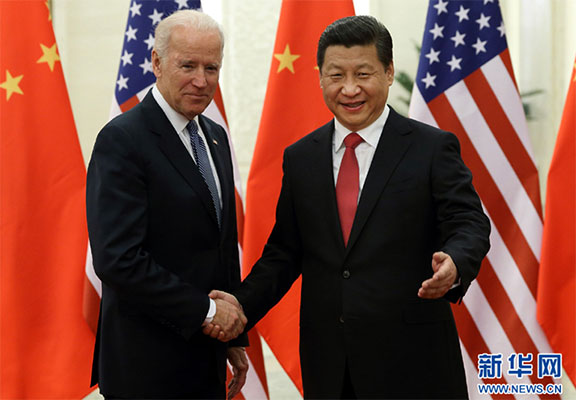
【Date】December 2013
【Location】Beijing
【Occasion】In talks with then-U.S. Vice President Joe Biden at the Great Hall of the People
【Remarks】The world today is far from peaceful. China and the U.S. shoulder a common responsibility for safeguarding global peace and stability and promoting the development and progress of mankind. Strengthening dialogue and cooperation is the only correct choice for the two countries. Both sides should unswervingly march forward in the development of bilateral relations, respect each other's core interests, actively explore practical cooperation, and properly manage sensitive issues and differences to ensure the sustained, healthy and stable development of China-U.S. relations.
17. Cooperation between China and the U.S. should be an anchor of global stability and a propellant of world peace
【Date】June 2013
【Location】California
【Occasion】Meet the press with then-U.S. President Barack Obama at the Annenberg Retreat
【Remarks】As economic globalization develops rapidly and all countries attempt to sail in the same boat when faced with difficulties, China and the U.S. should settle on a new kind of major-country relationship. Both sides should agree on a relationship based on mutual respect, cooperation and win-win results that benefit the citizens of both countries and the world. The international community expects the continuous improvement and development of China-U.S. relations. When the U.S. and China work together, we can be an anchor of global stability and a propellant of world peace.
18. The Chinese dream is connected to the American dream, and to the beautiful dreams of people in other countries
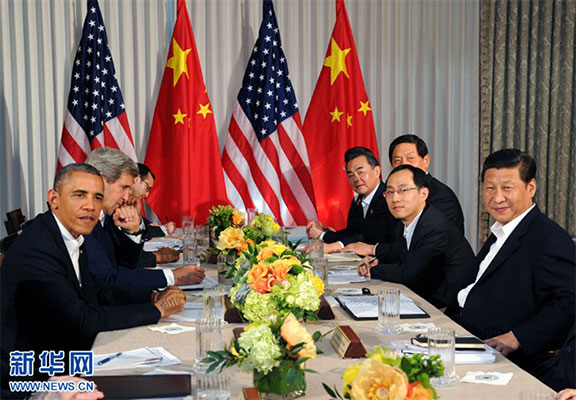
【Date】June 2013
【Location】California
【Occasion】In talks with then-U.S. President Barack Obama at the Annenberg Retreat
【Remarks】Pursuing the Chinese dream, we seek economic prosperity, national renewal and the wellbeing of the people. The Chinese dream is about peace, development, cooperation and win-win results, and it is connected to the American dream as well as the beautiful dreams of people in other countries.
19. Think big, act small
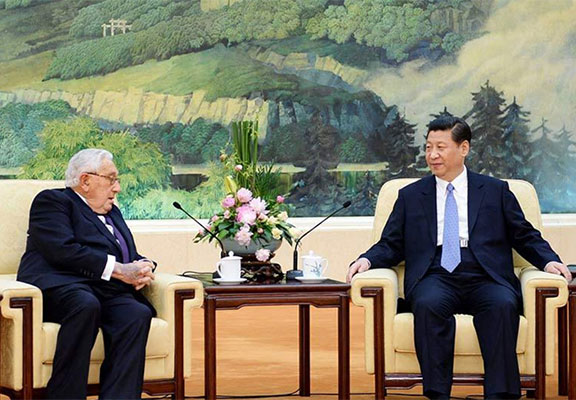
【Date】April 2013
【Location】Beijing
【Occasion】In talks with former U.S. Secretary of State Henry Kissinger at the Great Hall of the People
【Remarks】China and the U.S. should think big. The two sides should keep the big picture in mind, and always move in the right direction when it comes to bilateral relations. Meanwhile, the two sides should act small. The establishment of a new type of major-country relations between China and the U.S. is a gradual process.
20. The vast Pacific Ocean has enough room to accommodate the development of both China and the U.S.
【Date】April 2013
【Location】Beijing
【Occasion】In talks with then-U.S. Secretary of State John Kerry at the Great Hall of the People
【Remarks】The vast Pacific Ocean has enough room to accommodate the development of both China and the U.S. The two countries should interact positively in the Asia-Pacific region, step up communication and coordination on regional and international issues, and safeguard world peace, stability and prosperity.
 |

 Award-winning photos show poverty reduction achievements in NE China's Jilin province
Award-winning photos show poverty reduction achievements in NE China's Jilin province People dance to greet advent of New Year in Ameiqituo Town, Guizhou
People dance to greet advent of New Year in Ameiqituo Town, Guizhou Fire brigade in Shanghai holds group wedding
Fire brigade in Shanghai holds group wedding Tourists enjoy ice sculptures in Datan Town, north China
Tourists enjoy ice sculptures in Datan Town, north China Sunset scenery of Dayan Pagoda in Xi'an
Sunset scenery of Dayan Pagoda in Xi'an Tourists have fun at scenic spot in Nanlong Town, NW China
Tourists have fun at scenic spot in Nanlong Town, NW China Harbin attracts tourists by making best use of ice in winter
Harbin attracts tourists by making best use of ice in winter In pics: FIS Alpine Ski Women's World Cup Slalom
In pics: FIS Alpine Ski Women's World Cup Slalom Black-necked cranes rest at reservoir in Lhunzhub County, Lhasa
Black-necked cranes rest at reservoir in Lhunzhub County, Lhasa China's FAST telescope will be available to foreign scientists in April
China's FAST telescope will be available to foreign scientists in April